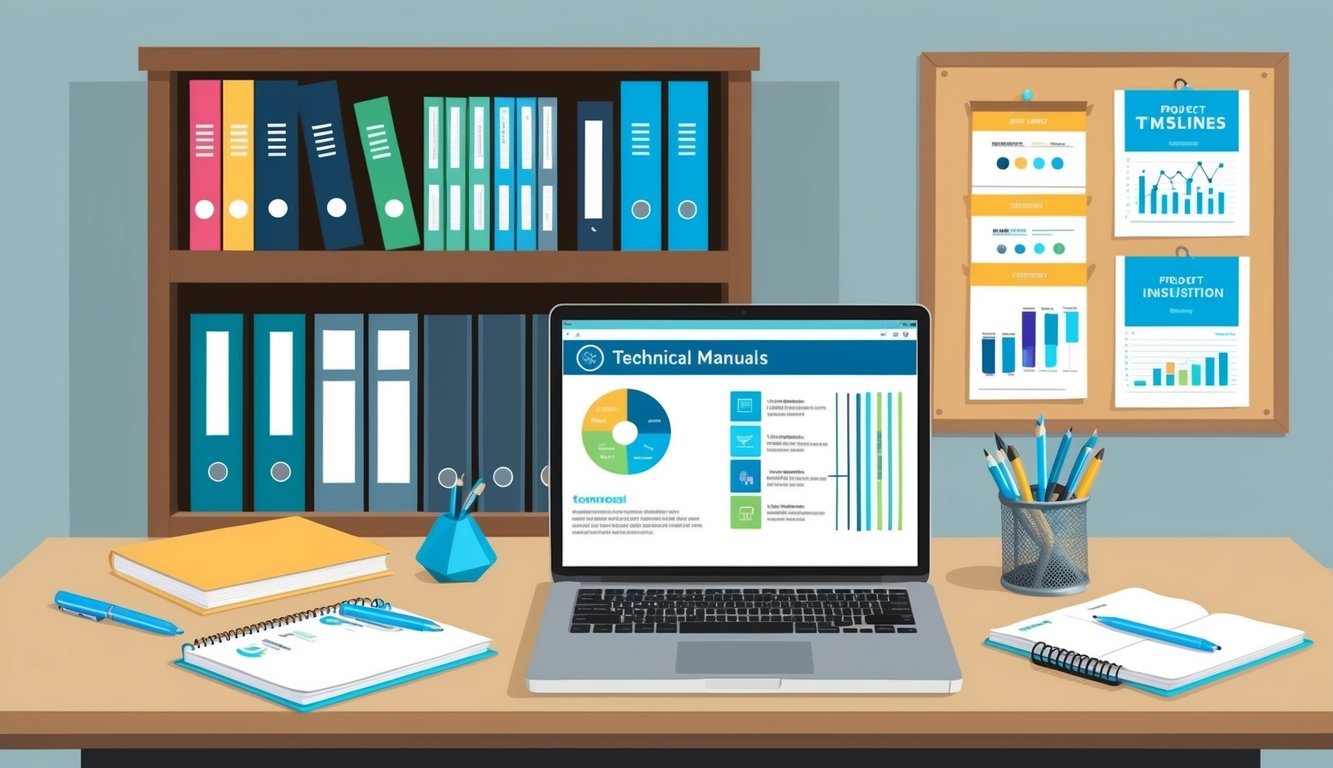Considering a side hustle in freelance technical writing? You’re onto something promising.
This field offers a unique blend of creativity and analytical thinking, perfect for those who enjoy breaking down complex concepts into digestible content.
Freelance technical writers can earn an average of $70,191 annually or $34 per hour.
Top earners can reach up to $133,000 per year.
As a freelance technical writer, you’ll craft clear and concise technical information for various formats, including user guides, white papers, and product manuals.
This versatility allows you to explore different niches and industries, expanding your expertise and client base.
Starting your journey in technical writing doesn’t require extensive experience.
With a solid grasp of language and a knack for simplifying complex ideas, you can begin building your portfolio and attracting clients.
As you grow, you’ll find opportunities to specialize in lucrative areas like grant writing or medical documentation, further increasing your earning potential.
Key Takeaways
- Technical writing offers above-average freelance income potential with flexible work options
- Building a diverse portfolio across various industries can lead to higher-paying opportunities
- Developing expertise in specialized niches can significantly boost your earning potential
Understanding Freelance Technical Writing
Freelance technical writing offers a flexible career path for those with strong writing and technical skills.
You’ll translate complex information into clear, user-friendly content for various industries.
The Role of a Technical Writer
As a freelance technical writer, you’ll create documentation, user manuals, and guides.
Your work helps users understand and use products or services effectively.
You might write for software companies, manufacturing firms, or government agencies.
Tasks often include:
- Simplifying complex concepts
- Creating step-by-step instructions
- Designing visual aids like diagrams or flowcharts
Technical writers collaborate with subject matter experts to ensure accuracy.
You’ll need to research topics extensively and organize information logically.
Key Writing and Communication Skills
Success as a freelance technical writer depends on your ability to convey information clearly.
Essential skills include:
- Strong writing: Craft concise, easy-to-understand content
- Attention to detail: Ensure accuracy in technical descriptions
- Research skills: Quickly grasp new concepts and technologies
- Project management: Meet deadlines and handle multiple projects
Tailoring your writing to your audience is crucial.
You’ll need to adapt your style for different readers, from novices to experts.
Proficiency with tools like Microsoft Word, Adobe FrameMaker, or DITA XML can boost your marketability.
Developing these skills will help you thrive in this lucrative field.
Setting Up Your Freelance Writing Side Hustle

Starting your freelance writing side hustle requires careful planning and preparation.
You’ll need to identify your niche, showcase your skills, and create a productive work environment.
Identifying Your Writing Niche
Finding your high-paying writing niche is crucial for success.
Consider your expertise, interests, and market demand.
Technical writing can be a lucrative option, focusing on:
- Software documentation
- User manuals
- API guides
- White papers
Research industry trends and rates to ensure your chosen niche is profitable.
Don’t be afraid to specialize further within technical writing, such as focusing on a specific industry or type of documentation.
Creating a Portfolio
Your portfolio is your calling card.
Gather your best writing samples to showcase your skills.
If you’re new to technical writing, create samples based on fictional projects.
Include a variety of document types to demonstrate your versatility.
Consider:
- A user guide for a hypothetical app
- A technical blog post explaining a complex concept
- An API documentation sample
Make sure your portfolio is easily accessible online.
You can use platforms like GitHub Pages or WordPress to host your samples.
Setting Up a Workspace
A dedicated workspace is essential for productivity.
Choose a quiet area in your home with good lighting and minimal distractions.
Invest in:
- A comfortable, ergonomic chair
- A desk with ample space for your computer and notes
- Reliable high-speed internet
Set up a separate business email and consider using project management tools like Trello or Asana to keep track of your assignments.
Don’t forget to establish a routine and set boundaries to maintain a healthy work-life balance as you juggle your side hustle with other commitments.
Finding and Securing Writing Gigs

To land technical writing gigs, you’ll need to know where to look and how to present yourself effectively.
Mastering online platforms, social media, and application techniques will boost your chances of success.
Leveraging Online Marketplaces
Upwork is a popular platform for finding writing jobs.
Create a compelling profile highlighting your technical expertise and writing samples.
Set competitive rates to attract clients.
FlexJobs specializes in remote work opportunities, including technical writing gigs.
It’s a paid service, but the quality of job listings can make it worthwhile.
Don’t overlook niche job boards focused on tech or writing.
These often have less competition and more targeted opportunities.
Consider bidding on projects even if you don’t meet all requirements.
Your unique perspective might be just what a client needs.
Effective Use of Social Media Platforms
LinkedIn is your best friend for professional networking.
Optimize your LinkedIn profile to showcase your technical writing skills and experience.
Join LinkedIn groups related to technical writing and engage in discussions.
This can lead to valuable connections and job opportunities.
Twitter can be surprisingly effective for finding writing gigs.
Follow companies and individuals in your niche, and use relevant hashtags like #TechnicalWriting or #FreelanceWriter.
Share your own content on social media to demonstrate your expertise.
This could be blog posts, articles, or even short tips related to technical writing.
Writing a Winning Cover Letter
Your cover letter is often your first impression, so make it count.
Tailor each cover letter to the specific job or client you’re applying to.
Research the company or project thoroughly.
Show how your skills and experience align with their needs.
Highlight specific examples of your technical writing work that relate to the gig you’re applying for.
Quantify your achievements where possible.
Keep your tone professional yet personable.
Show enthusiasm for the opportunity and explain why you’re the perfect fit for the job.
Expanding Your Services Portfolio

As a freelance technical writer, diversifying your skills can lead to more opportunities and higher earnings.
Branching out into different writing areas allows you to attract a wider range of clients and projects.
Diverse Writing Jobs
You can expand your portfolio by taking on various writing jobs. Blogging is an excellent way to showcase your expertise in different technical fields.
Consider creating content for company websites or industry publications.
Copywriting for tech products can be lucrative.
You’ll craft compelling product descriptions, landing pages, and marketing materials.
Content writing for technical topics is in high demand.
This includes white papers, case studies, and in-depth articles explaining complex concepts to different audiences.
Editing and Proofreading
Your technical writing skills make you well-suited for editing and proofreading roles.
You can offer these services to other writers or directly to companies.
Technical document editing involves reviewing and improving the clarity, structure, and accuracy of technical content.
This can include user manuals, specifications, and research papers.
Proofreading focuses on catching grammar, spelling, and formatting errors.
Your attention to detail is crucial in ensuring documents are error-free and professional.
Ghostwriting and Grant Writing
Ghostwriting allows you to write on behalf of others, often industry experts or executives.
You’ll create articles, books, or speeches in their voice, sharing technical knowledge with a broader audience.
Grant writing is a specialized skill that can be highly rewarding.
You’ll help organizations secure funding for technical projects or research.
This involves crafting compelling proposals that explain complex ideas clearly and persuasively.
Both these roles require strong research skills and the ability to adapt your writing style to different voices and requirements.
Optimizing Your Online Presence

A strong online presence is crucial for freelance technical writers.
It helps you attract clients, showcase your expertise, and build credibility in your niche.
Developing a Professional Website
Create a sleek, user-friendly website that highlights your technical writing skills.
Include a portfolio of your best work, focusing on diverse projects that demonstrate your versatility.
Showcase testimonials from satisfied clients to build trust.
Add a clear, concise “About Me” page that emphasizes your technical knowledge and writing expertise.
Include your education, certifications, and relevant experience.
Optimize your site for search engines by using relevant keywords in your content and meta descriptions.
This will help potential clients find you more easily when searching for technical writers.
Engaging Through Blog Content
Start your own blog to showcase your writing skills and technical knowledge.
Choose topics that align with your niche and demonstrate your expertise.
Write in-depth, informative articles that provide value to your target audience.
Use clear, concise language and break down complex technical concepts into easily digestible content.
Consistency is key.
Aim to publish new blog posts regularly, whether it’s weekly or bi-weekly.
This keeps your website fresh and gives you content to share on social media.
Active Social Media Writing
Leverage social media platforms to expand your reach and connect with potential clients.
Choose platforms where your target audience is most active, such as LinkedIn for B2B clients or Twitter for tech-savvy professionals.
Share your blog posts, industry news, and helpful tips related to technical writing.
Engage with your followers by responding to comments and participating in relevant discussions.
Create engaging content specifically for each platform.
For example, write concise, informative threads on Twitter or create polished, professional posts for LinkedIn.
Collaborate with other technical writers or industry professionals to expand your network and reach a wider audience.
This can lead to new opportunities and referrals.
Mastering Content Creation and Management

Effective technical writing requires proficiency in various content types and management strategies.
You’ll need to develop skills in creating compelling documents, communicating complex information clearly, and organizing your work efficiently.
Creating Engaging White Papers and Case Studies
White papers and case studies are powerful tools for showcasing technical expertise.
When crafting white papers, focus on presenting in-depth analysis of specific issues or solutions.
Use clear, jargon-free language to explain complex concepts.
For case studies, highlight real-world applications of your technical solutions.
Structure them with a problem statement, solution description, and measurable results.
Include quotes from satisfied clients to add credibility.
Content creation for these documents often involves collaboration with subject matter experts.
Develop strong interviewing skills to extract key information efficiently.
Developing Effective Email Newsletters
Email newsletters are a great way to keep your audience informed about technical updates or industry trends.
Start by defining your target audience and their interests.
Craft attention-grabbing subject lines to improve open rates.
Keep your content concise and scannable.
Use bullet points and short paragraphs to highlight key information.
Include a mix of technical insights, industry news, and practical tips.
Consider using a template to maintain consistency across issues.
Always include a clear call-to-action, whether it’s to read a full article, sign up for a webinar, or try a new feature.
Crafting Comprehensive Technical Documentation
Technical documentation is crucial for user understanding and product adoption.
Start by outlining the document structure before diving into content creation.
Use clear headings and subheadings to organize information logically.
Include step-by-step instructions with screenshots or diagrams where appropriate.
Write in simple, direct language, avoiding unnecessary jargon.
Consider creating a glossary for essential technical terms.
For API documentation, provide clear explanations of endpoints, parameters, and response formats.
Include code samples in multiple programming languages to cater to different developers.
Use version control systems to manage documentation updates efficiently.
Regularly review and update your docs to ensure accuracy and relevance.
Building a Passive Income Stream

As a freelance technical writer, you can leverage your skills to create ongoing revenue streams.
These methods allow you to earn money long after the initial work is complete.
Self-Publishing for Writers
You can publish a book on technical topics to generate passive income.
Choose a niche where you have expertise and create an ebook or print-on-demand book.
Platforms like Amazon KDP make it easy to self-publish.
Research trending topics in your field to ensure there’s demand.
Outline your book carefully and break it into digestible chapters.
Use your technical writing skills to explain complex concepts clearly.
Promote your book through your professional network and social media.
Consider offering a free sample chapter to attract readers.
As sales come in, you’ll earn royalties without additional effort.
Affiliate Marketing and Writing Reviews
Your writing skills can earn you commissions through affiliate marketing.
Create a blog or website focused on your technical niche.
Write in-depth product reviews and how-to guides that naturally incorporate affiliate links.
Choose products relevant to your audience, such as software tools or technical gadgets.
Sign up for affiliate programs with companies in your industry.
Amazon Associates is a good starting point for tech products.
Be transparent about your affiliate relationships.
Provide honest, detailed reviews to build trust with your readers.
As your traffic grows, so will your passive income from affiliate commissions.
Online Courses and Tutoring
Create an online course to share your technical knowledge.
Platforms like Udemy or Teachable allow you to upload video lessons and supporting materials.
Once set up, these courses can generate ongoing revenue.
Choose a specific technical skill to teach, such as “Mastering API Documentation” or “Effective UX Writing”.
Break your course into short, focused modules.
Include practical exercises and quizzes to enhance learning.
Complement your course with one-on-one tutoring sessions.
This personalized approach can command higher rates.
Use scheduling tools to manage bookings efficiently.
As you build a reputation, you can increase your rates and expand your student base.
Project and Client Management Tactics

Effective project and client management is crucial for success as a freelance technical writer.
You’ll need to balance multiple tasks, communicate clearly, and build strong client relationships to thrive in this side hustle.
Tools for Project Management
As a technical writer, you’ll juggle multiple projects simultaneously. Project management tools can help you stay organized and meet deadlines.
Trello is great for visualizing your workflow, while Asana excels at task assignment and tracking.
Dropbox is essential for file storage and sharing.
It allows you to access your work from anywhere, making it perfect for your flexible schedule.
For time tracking, try Toggl or RescueTime to ensure you’re billing accurately and maximizing productivity.
Don’t forget about research tools.
Evernote or OneNote can help you collect and organize information for your projects.
Effective Communication Strategies
Clear communication is key to your success as a freelance technical writer.
Set up regular check-ins with clients to discuss project progress and address any concerns.
Use video calls for complex discussions, but don’t underestimate the power of a quick email update.
Always ask clarifying questions early in the project.
This shows initiative and helps prevent misunderstandings later on.
When explaining technical concepts, use analogies or visual aids to make information more accessible to your clients.
Be responsive to client feedback.
If a client suggests changes, acknowledge their input and explain how you’ll incorporate it.
This collaborative approach builds trust and leads to better outcomes for both parties.
Client Retention and Lead Generation
Building long-term relationships with clients is crucial for a stable income.
Deliver high-quality work consistently and meet deadlines to become their go-to technical writer.
Offer additional services like content strategy or SEO optimization to increase your value.
For lead generation, leverage your network.
Let former colleagues know about your freelance services.
Join online communities for technical writers and contribute valuable insights to establish yourself as an expert.
Create a portfolio website showcasing your best work.
Include testimonials from satisfied clients to build credibility.
Consider using platforms like Contently to connect with potential clients and showcase your expertise in specific industries or topics.
Expanding Beyond Writing
Technical writing opens doors to diverse opportunities that leverage your communication skills.
By branching out, you can increase your income and expand your professional network.
Offering Personal Writing Services
You can turn your writing prowess into a lucrative side hustle by offering personal writing services. Resume writing is a highly sought-after skill.
Many job seekers struggle to craft compelling resumes, making your expertise invaluable.
Consider offering cover letter writing services as well.
A well-written cover letter can make a significant difference in a job application.
You might also explore writing personal statements for college applications or professional bios for websites and social media profiles.
These services allow you to help individuals showcase their best selves through your writing.
Speech Writing and Presentation Assistance
Your technical writing skills can translate well into speech writing and presentation assistance.
Many professionals and students need help crafting persuasive speeches or creating engaging presentations.
You can offer services to write speeches for various occasions, from weddings to corporate events.
Additionally, you can assist clients in developing eye-catching slide decks and handouts to accompany their presentations.
This combination of writing and visual communication can set you apart in the market.
Venturing into Social Media Management
As a technical writer, you’re well-equipped to manage social media platforms for businesses or individuals.
Your skills in concise, clear communication are perfect for crafting engaging social media content.
You can offer services to create and schedule posts, respond to comments, and develop content strategies.
Many businesses need help maintaining a consistent online presence across multiple platforms.
Consider specializing in specific industries or platforms to stand out.
For example, you could focus on LinkedIn content for tech companies or Instagram management for small businesses.
By expanding into social media management, you’ll diversify your income streams and gain valuable digital marketing experience.
Marketing Your Freelance Business
Promoting your freelance technical writing services effectively can help you attract clients and grow your business.
A strategic approach to marketing will showcase your expertise and set you apart in a competitive field.
Identifying and Targeting Your Audience
To market your freelance technical writing services, you need to know who your ideal clients are.
Consider the industries you’re most familiar with or passionate about.
Are you interested in writing for software companies, healthcare organizations, or manufacturing firms?
Research where your target audience spends time online.
Look for industry-specific forums, LinkedIn groups, or professional associations.
These platforms can be goldmines for connecting with potential clients.
Create buyer personas to help you understand your clients’ needs, pain points, and preferences.
This will guide your marketing efforts and help you tailor your message to resonate with your audience.
Strategies for Online Promotion
Your online presence is crucial for attracting clients.
Start by creating a professional website showcasing your portfolio and services.
Include testimonials from satisfied clients to build credibility.
Earn money writing by leveraging platforms like Fiverr or TextBroker.
These sites can help you gain experience and build a client base while you develop your own marketing channels.
Use social media to share your expertise.
Post writing tips, industry insights, or behind-the-scenes glimpses of your work process.
Engage with your followers to build relationships and establish yourself as a thought leader.
Consider starting a blog to demonstrate your writing skills and knowledge.
This can also improve your website’s SEO, making it easier for potential clients to find you.
Building a Personal Brand
Your personal brand sets you apart from other freelance technical writers.
Develop a unique value proposition that highlights your specific skills and experience.
Create a consistent visual identity across all your marketing materials.
Use the same profile picture, color scheme, and logo (if you have one) on your website, social media, and business cards.
Attend industry events and conferences to network and gain visibility.
Consider speaking at events or hosting webinars to showcase your expertise and make money writing.
Collaborate with other professionals in your field.
Guest posting on popular industry blogs or participating in podcasts can expand your reach and boost your credibility.
Remember, building a strong personal brand takes time and effort, but it’s a powerful way to attract high-quality clients and command better rates for your services.
Long-Term Growth and Scaling
Expanding your freelance technical writing side hustle requires strategic planning and adaptability.
You’ll need to explore new income streams, leverage technology, and build financial security to achieve sustainable growth.
Diversifying Income Sources
Consider branching out beyond traditional user guides.
You can explore writing for online publications or specialized industry blogs.
Tech companies often need white papers, case studies, and API documentation.
Don’t shy away from creating video scripts for technical tutorials or product demos.
Expand your services to include editing and proofreading technical content.
Offer consultation services to help businesses improve their documentation processes.
You might even develop and sell online courses teaching technical writing skills to aspiring freelancers.
Remember, diversification helps protect you from market fluctuations and client loss.
Upgrading Your Business with Tools and Software
Invest in tools that boost your productivity and output quality.
A robust grammar checker like Grammarly can elevate your writing.
Project management software such as Trello or Asana helps you juggle multiple clients and deadlines effortlessly.
Consider specialized technical writing software like MadCap Flare or Adobe FrameMaker for complex documentation projects.
These tools can significantly speed up your workflow and allow you to take on larger, more lucrative projects.
Cloud storage solutions ensure your work is always backed up and accessible.
Implement time-tracking software to optimize your billing and improve productivity.
Planning for Financial Stability
Set clear financial goals for your writing side hustle.
Aim to build an emergency fund covering 3-6 months of expenses.
This buffer protects you during slow periods or unexpected setbacks.
Consider diversifying your income beyond client work.
Create and sell digital products like eBooks or templates related to technical writing.
These passive income streams can provide stability during lean times.
Regularly review and adjust your rates to reflect your growing expertise and market demand.
Don’t undervalue your skills – experienced technical writers command premium rates.
Explore retirement savings options for self-employed individuals, such as a SEP IRA or Solo 401(k).
Planning for the future ensures long-term financial security in your freelance career.
Frequently Asked Questions
Aspiring freelance technical writers often have questions about getting started, finding jobs, earning potential, and necessary skills.
Let’s address some common concerns to help you navigate this rewarding side hustle.
How do I start a side hustle in freelance technical writing as a beginner?
To start as a beginner, focus on developing your writing skills and building a portfolio. Research your chosen niche thoroughly and practice writing clear, concise content.
Create sample pieces to showcase your abilities.
Reach out to small businesses or startups that might need technical documentation.
Consider offering your services at a competitive rate initially to gain experience and testimonials.
What are effective strategies for finding remote freelance technical writing jobs?
Job boards like Upwork, Freelancer, and LinkedIn are great places to start.
Create profiles highlighting your skills and experience.
Network with other writers and join professional associations to learn about opportunities.
Customize your applications for each job and emphasize your unique strengths.
Don’t shy away from entry-level positions, as they can lead to more lucrative opportunities later.
How much can a freelance technical writer expect to earn per hour or per project?
Freelance technical writers earn an average of $70,191 a year, or about $34 per hour.
However, rates can vary widely based on experience, niche, and project complexity.
As a beginner, you might start at a lower rate and increase it as you gain experience.
Some writers charge per word or project instead of hourly.
What are the essential skills needed to succeed in freelance technical writing?
Strong writing and editing skills are crucial.
You should be able to explain complex concepts in simple terms.
Research skills are important for understanding technical subjects.
Familiarity with industry-specific tools and software is beneficial.
Time management and communication skills are essential for meeting deadlines and working with clients.
Can one realistically earn $1000 a month from freelance technical writing?
Yes, earning $1000 a month is achievable, especially as you gain experience.
With consistent work, you could reach this goal by completing a few medium-sized projects or several smaller ones each month.
Remember that building a steady client base takes time.
As you improve your skills and reputation, your earning potential will increase.
What are the pros and cons of pursuing technical writing as a side hustle?
Pros include flexible hours, the ability to work remotely, and the opportunity to learn about various industries.
It can be a lucrative side hustle with potential for growth.
Cons may include inconsistent workload, especially when starting out.
Meeting tight deadlines can be challenging, and you’ll need to continuously update your skills to stay competitive in the field.


